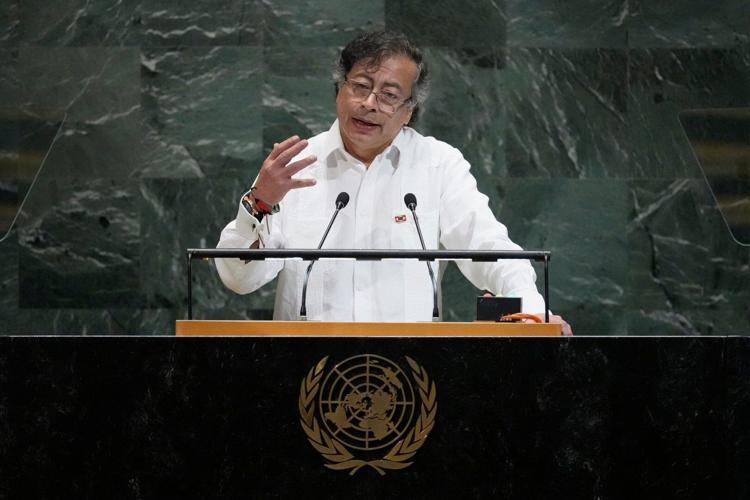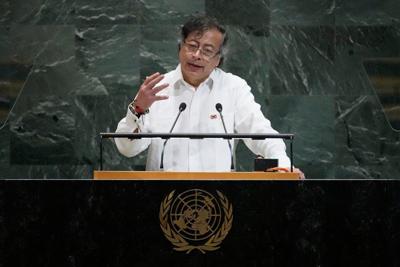UNITED NATIONS (AP) ŌĆö Every year, tons of heroin, cocaine, methamphetamine and other drugs flow around the world, an underground river that crisscrosses borders and continents and spills over into violence, addiction and suffering. Yet when nations’ leaders give the U.N. their annual take on big issues, drugs don’t usually get much of the spotlight.
But this was no usual year.
First, U.S. President Donald Trump touted his aggressive approach to drug enforcement, including decisions to designate some Latin American and to carry out deadly that he says said were carrying drugs in the southern Caribbean.
ŌĆ£To every terrorist thug smuggling poisonous drugs into the United States of America: Please be warned that we will blow you out of existence,ŌĆØ he boasted at the U.N. General Assembly on Tuesday.
Hours later, his Colombian counterpart fired back that Trump should face criminal charges for allowing an attack on unarmed “young people who were simply trying to escape poverty.ŌĆØ
The U.S. ŌĆ£anti-drug policy is not aimed at the public health of a society, but rather to prop up a policy of domination,ŌĆØ Colombia’s Gustavo Petro bristled, accusing Washington of ignoring domestic drug dealing and production while demonizing his own country. The U.S. recently , for the first time in decades, as a nation falling short of its international drug control obligations.
Fissures in approach to the issue are revealed
The barbs laid bare, on global diplomacy’s biggest stage, the world’s wide and pointed differences over how to deal with drugs.
ŌĆ£The international system is extremely divided on drug policy,ŌĆØ said Vanda Felbab-Brown, who has followed the topic as a senior fellow at the Washington-based Brookings Institution think tank. ŌĆ£This is not new, but itŌĆÖs really just very intense at this UNGA.ŌĆØ
While the wars in and , and got much of the focus in the U.N.‘s marathon week of speeches and meetings, the topic of drugs turned up from Trump’s and Petro’s tough talk to side events on such themes as gender-inclusive drug policy and international cooperation to fight organized crime.
Some 316 million people worldwide used marijuana, opioids and/or other drugs in 2023, a 28% rise in a decade, according to the available from the U.N. Office on Drugs and Crime. The figures donŌĆÖt count alcohol or tobacco use.
The specifics vary by region, with , in Southeast Asia, and in West and Central Africa and continuing to trouble North America, though opioid-related .
The U.N. drug office says trafficking is increasingly dominated by organized crime groups with tentacles and partnerships around the world, and nations need to think just as broadly about trying to tackle the syndicates.
ŌĆ£Governments are increasingly seeing organized crime and drug trafficking as threats to national and regional security and stability, and some are coming around to the fact that they need to join up diplomatic, intelligence, law enforcement and central-bank efforts to push back,ŌĆØ agency chief of staff Jeremy Douglas said by email.
Although organized crime hasn’t featured very prominently in top-level discussions at the General Assembly to date, he said, ŌĆ£weŌĆÖre at a point where this needs to, and hopefully will, change.ŌĆØ
Working together can help
Nations pair up in various joint counternarcotics operations and working groups and sometimes form regional coalitions, but some experts and leaders see a need to go global.
Countries need to ŌĆ£pool resources in a fight that must be a common cause among all nations,ŌĆØ Panamanian President Jos├® Ra├║l Mulino told the assembly. He said his nation had seized a ŌĆ£historic and alarmingŌĆØ total of 150 tons of cocaine and other drugs this year alone.
To be sure, there is already some global-scale collaboration on drug control. The U.N. Commission on Narcotic Drugs under decades-old treaties, and it can make policy recommendations to the U.N.‘s member countries. The International Narcotics Control Board monitors treaty compliance.
But the U.N. is big-tent politics at its biggest, so even as some components of the world body deal with drug enforcement, others emphasize public health programs ŌĆö substance abuse treatment, overdose prevention and other services ŌĆö over prohibition and punishments.
The U.N. High Commissioner for Human Rights, Volker T├╝rk, has decriminalizing at least some drug use while clamping down on illegal markets. Given that policing hasn’t reduced substance use or crime, ŌĆ£the so-called war on drugs has failed, completely and utterly,ŌĆØ he said last year.
Separately, a U.N. Development Programme report last week said punitive drug control had led to deaths and disease among users who shied from seeking help, racial disparities in enforcement, and other societal downsides.
At a gathering marking the report’s release, former Mexican President Ernesto Zedillo deplored that ŌĆ£the global drug control regime has become a substantial part of the problem.ŌĆØ
ŌĆ£The question is: Do governments have the wisdom and courage to act?ŌĆØ asked Zedillo, now a Yale professor and a commissioner of the Global Commission on Drug Policy, a Geneva-based anti-drug-war advocacy group.
How can common ground be found?
The other question is whether they could ever agree on what action to take.
Even if countries agree ŌĆö or say they do ŌĆö with ending the drug trade and resulting ills, ŌĆ£the objectives might be different, and certain means, tools, resources they’re willing to devote to them, are different,ŌĆØ Felbab-Brown said.
Nations’ own drug laws vary widely. Some for certain drug crimes. Others have or marijuana. At least one ŌĆö Thailand ŌĆö legalized it only to . Countries’ openness to programs, and other is similarly all over the map.
As leaders took their turns at the assembly rostrum this week, observers got occasional glimpses of the world’s different views of its drug problem.
Tajikistan’s president, Emomali Rahmon, called drug trafficking ŌĆ£a serious threat to global security.ŌĆØ Guyanese President Irfaan Ali endorsed international efforts to address drug trafficking, which he counted among the ŌĆØcrimes that are destroying the lives of our people, especially young people.ŌĆØ
Syria’s new president, Ahmad al-Sharaa, noted that his administration closed factories that produced the , also known as fenethylline, during his now-ousted predecessor’s time. Costa Rican Foreign Minister Arnoldo Andr├® Tinoco said drug smuggling networks are exploiting routes traveled by migrants and ŌĆ£taking advantage of the vulnerability of those seeking international protection.ŌĆØ
ŌĆ£Isolated responses are insufficient,ŌĆØ as the traffickers just go elsewhere and create new hotspots of crime, Tinoco said.
Reviewing the challenges facing Peru, President Dina Boluarte listed transnational organized crime and drug trafficking alongside political polarization and climate change.
ŌĆ£None of these problems is merely national, but rather global,ŌĆØ she said. ŌĆ£This is why we need the United Nations to once again be a forum for dialogue and cooperation.ŌĆØ































